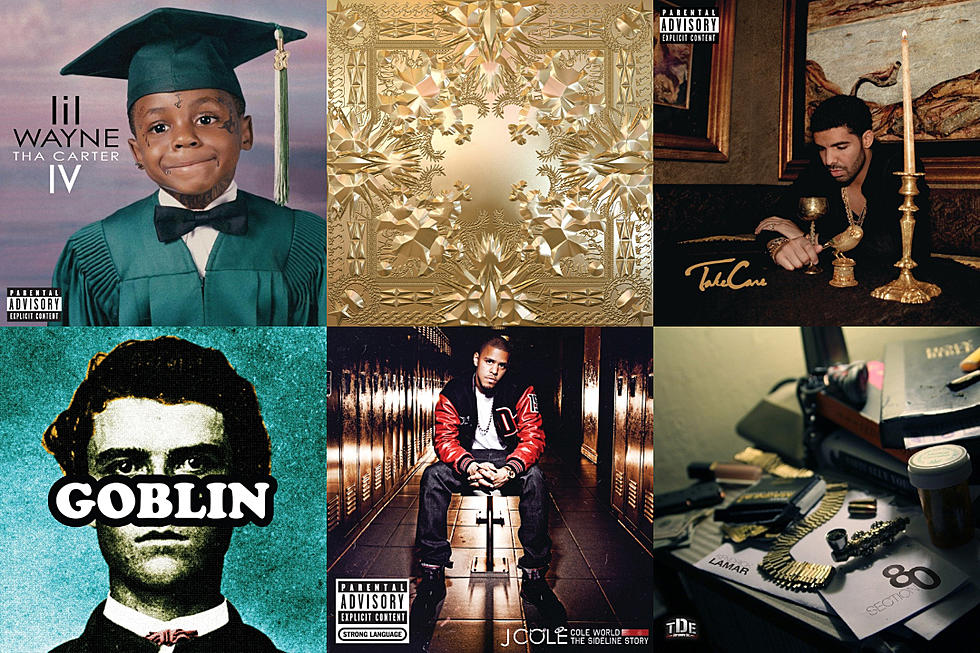
The Roots Impress With Their Most Ambitious Effort On ‘And Then You Shoot Your Cousin’
Earlier this year, while describing to XXL the logic behind The Roots’ newest concept album And Then You Shoot Your Cousin, bandleader Black Thought finished by bluntly saying, “I don’t know if that makes any sense.” The admission was a result of trying to sum up the significance of the album, which he described as being extremely “dense.” Anyone who attended the album’s release party in New York last week knows what he meant; full of balloon animals hanging from nooses, didgeridoo players and spoken-word performances, the party left its attendees just as confused as they were entertained. But the veil of complexity surrounding the project shouldn’t be viewed as a negative. Rather, the multiple story lines, personalities and themes conveyed on it are all part of one large narrative that allows listeners to discover something new on each listen. Mix that in with the facts that its musically beautifully dark and theatrical, and that Black Thought, as always, is stellar on the mic, and you come away realizing that The Roots have once again created something special and meaningful.
The album opens with Nina Simone’s somber “Theme From The Middle Of The Night,” the title track off the 1959 film of the same name. The film, adapted from a Broadway play, was a tale of forbidden love (a young woman falls in love with her older Jewish boss), but also a commentary on the idea of freedom in America at the time. ATYSYC can be interpreted as a modern take on the same concept; perhaps more so than any hip-hop album in quite some time, it sums up what life is like in America for those born without entitlement. This is evident on tracks like “Never,” which features Thought spitting painfully honest lines like “I’m trying to keep both feet on the ground…I wish I could rest,” and “I’m getting wasted on an everyday basis…I’m gonna go quietly” from the perspective of an-out-of-work hustler trying to live his days out with dignity. On the piano-driven “The Dark (Trinity),” he spits a similar narrative, but with a larger emphasis on being a minority in a country that is built to repress, rhyming “the law of gravity meets of law of averages” with “in attempting to civilize savages.” Things get even more racially focused on “Understand,” when Thought leaves you cold in your tracks with the line, “Grave digger, dig a hole fit for a black nigger.” The band’s drummer (and now pop-culture tastemaker) Questlove recently wrote an extensive six-part series for Vulture.com on how hip-hop has failed Black America, and one of the reasons he gives is that the genre no longer represents poor black people. ATYSYC makes a point of doing so.
But it would be wrong to call the album solely a perspective on Black America. Many of its songs speak to the oppressed in general, whether you’re a minority, a drug addict or a “sex-addicted introvert,” as Thought describes on “When the People Cheer.” If there’s an overarching narrative to the album, it’s one focused on those who don’t conform with society—not just a certain subgroup. Longtime Roots’ collaborator Greg Porn sums it up nicely on the chorus of “The Dark (Trinity),” when he sings, “The world ain’t ready for me.”
Beyond the narrative, there’s still plenty to like about ATYSYC. Black Thought once again shows off why he’s one of the most underrated MCs of all time, opening the album with the line, “I was born faceless in an oasis” and staying in dropping-gems mode for the rest of the project, including on “Understand,” when he coldly barks, “put a sucker in a box like Dracula.” The instrumentals he raps over, crafted by Quest, guitarist Captain Kirk Douglas and the gang, have remnants of gospel, soul and even electronic ambient in them. Many of the tracks feature only one verse and value intricate instrument solos and improvisation more than vocals. Other moments, like the Mary Lou Williams-sampling “The Devil” and the Brian Eno-sounding finish of “The Coming” serve more as tension-setting interludes than actual songs. Because it’s formatted this way and only around 34 minutes long, ATYSYC almost comes off more as a guideline for a theatrical production than an album.
For some, its exaggerated makeup may be a turnoff. And, honestly speaking, it does take some work to grasp what ATYSYC is really about. It features no songs—except maybe the bouncy closer “Tomorrow”—that will hit you immediately like “You Got Me,” “The Seed 2.0” or “Here I Come.” But it’s well worth the time and effort. The Roots have not only proven once again that they are one of hip-hop’s most consistent acts, but also one of the genre’s most important.—Reed Jackson
More From XXL









